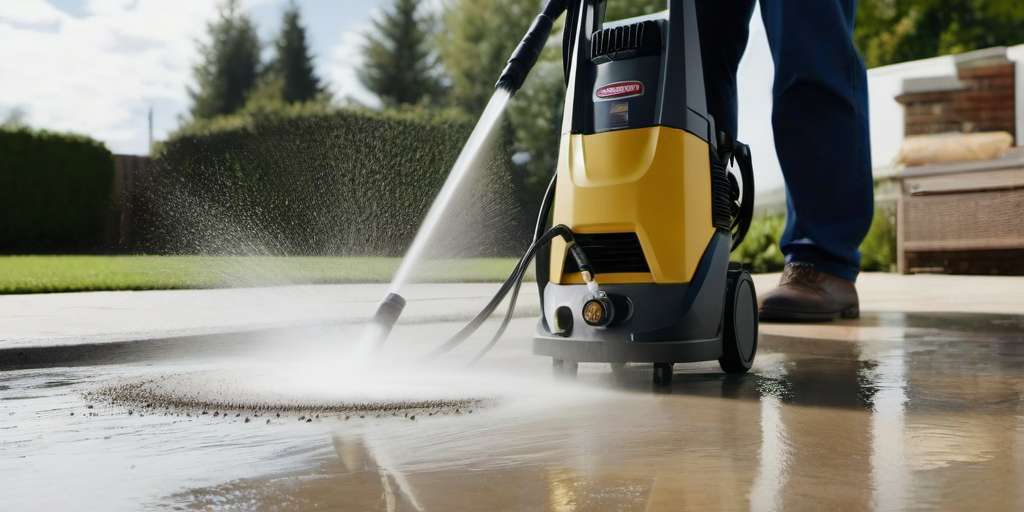Pressure Cleaning: Essential Guide to Effective and Safe Techniques
Pressure Cleaning: Essential Guide to Effective and Safe Techniques
Pressure cleaning, also known as power washing, uses high-pressure water to remove dirt, mold, and grime from various surfaces. It’s a popular choice for cleaning buildings, vehicles, and concrete surfaces. This technique offers numerous benefits, including improved aesthetics and reduced allergen exposure. It involves different types of equipment and methods to ensure effective cleaning for both residential and commercial use.

Understanding Pressure Cleaning
Pressure cleaning offers an effective way to remove dirt, grime, and other contaminants from various surfaces. This section provides a comprehensive understanding of the technique and its advantages.
What is Pressure Cleaning?
Pressure cleaning, also known as power washing, employs high-pressure water sprays to remove loose paint, mold, grime, dust, mud, and dirt from surfaces and objects. Various surfaces benefit from this technique, including buildings, vehicles, and concrete surfaces.
Benefits of Pressure Cleaning
The advantages of using pressure cleaning are numerous, making it a favored choice among homeowners and businesses:
- Improves curb appeal by removing stains and discoloration.
- Reduces allergens by eliminating mold and mildew.
- Extends the lifespan of surfaces by preventing decay and degradation.
- Increases property value by maintaining a clean and presentable exterior.
- Prepares surfaces for painting or refinishing by providing a clean slate.
Pressure Washing vs. Power Washing
Definitions and Key Differences
The terms “pressure washing” and “power washing” are often used interchangeably, but there are differences:
- Pressure Washing: Utilizes unheated water at high pressure to clean surfaces. Suitable for removing grime, dirt, and other contaminants without the need for hot water.
- Power Washing: Combines high-pressure water with heated water. The heat aids in removing tougher substances like grease and oil, making it ideal for industrial and commercial tasks.
Ideal Applications for Each Method
Both methods have their specific applications depending on the cleaning requirements:
- Pressure Washing Applications:
- Residential cleaning of exteriors, roofs, gutters, and driveways.
- Removing mold and mildew from walls and siding.
- Cleaning outdoor furniture and decks.
- Power Washing Applications:
- Clearing grease and oil stains from garage floors and parking lots.
- Cleaning heavy equipment and industrial machinery.
- Maintenance of commercial properties, including façades and sidewalks.
Equipment and Techniques for Pressure Cleaning
Pressure cleaning involves specialized equipment and techniques for efficient and effective cleaning. This section delves into the various tools and methods used in pressure cleaning.
Pressure Washers: Types and Uses
Cold Water Pressure Washers
Cold water pressure washers are commonly used for general residential cleaning tasks. These machines are effective in removing dirt, dust, and debris from surfaces such as siding, windows, and driveways. They are straightforward to use and typically more affordable than their hot water counterparts. Due to their ease of operation, they are ideal for less grimed surfaces or regular maintenance cleaning.
Hot Water Pressure Washers
Hot water pressure washers are specially designed to tackle tougher cleaning jobs that involve grease, oil, and other stubborn residues. The heated water breaks down these substances more effectively than cold water. This makes them perfect for commercial applications, such as cleaning garages, industrial equipment, and service stations. They are a bit more complex to operate but offer superior cleaning power for challenging tasks.
Choosing the Right Nozzle
Types of Nozzles
The nozzle is a critical component of a pressure washer as it determines the spray pattern and intensity. There are several types of nozzles:
- 0° Nozzles: Provide a concentrated and powerful stream for tough stains, typically used with caution.
- 15° Nozzles: Used for heavy-duty cleaning tasks, including paint stripping and removing grime from concrete.
- 25° Nozzles: Ideal for general cleaning tasks, such as washing decks and driveways.
- 40° Nozzles: Suitable for lighter cleaning tasks like washing cars, windows, and outdoor furniture.
- Soap Nozzles: Specifically designed for applying detergents and cleaning solutions.
Safety Tips for Using Nozzles
Using the correct nozzle is essential for both efficiency and safety. Here are some tips to ensure safe operation:
- Always start with a wider spray pattern to avoid damaging surfaces.
- Never point the nozzle at yourself or others to prevent injury.
- Adjust the pressure gradually and test on a small area before cleaning the entire surface.
- Regularly inspect nozzles for wear and tear to maintain optimal performance.
Accessories to Improve Cleaning Efficiency
Surface Cleaners
Surface cleaners are specialized attachments that enhance the efficiency of pressure washing on flat surfaces. They consist of multiple high-pressure nozzles attached to a rotating bar. This design allows for uniform cleaning, reducing streaks and lines. Surface cleaners are excellent for cleaning large areas quickly, such as driveways, patios, and sidewalks.
Pressure Cleaning Hoses
High-quality pressure cleaning hoses are vital for optimal performance. They are designed to withstand high-pressure water flows and provide flexibility and durability. There are a few types to consider:
- Standard Hoses: Affordable and suitable for general residential use.
- Heavy-Duty Hoses: Durable and designed for high-pressure commercial applications.
- Extension Hoses: Provide extended reach for large areas without moving the machine.
Regular maintenance and proper storage of hoses will prolong their lifespan and ensure consistent performance.
Pressure Cleaning Services: What to Expect
Pressure cleaning services can enhance the appearance and hygiene of various surfaces. When considering professional options, it’s important to know what to expect in terms of quality and efficiency.
Seeking a Professional Service
Pressure Cleaning Near Me
Finding a nearby pressure cleaning service is essential for convenience and quick response times. Searching online for “pressure cleaning near me” can yield a list of available professionals in your area. It’s also helpful to check local business directories and reviews to gauge the reliability and quality of services provided.
What to Look For in a Service
When selecting a professional pressure cleaning service, consider the following factors:
- Experience: Look for companies with extensive experience in pressure cleaning various types of surfaces.
- Equipment: Ensure they use high-quality, well-maintained equipment suitable for your specific cleaning needs.
- References: Check reviews and ask for references to verify the quality of their work.
- Insurance: Confirm they have appropriate insurance to cover any potential damage during the cleaning process.
Commercial Pressure Cleaning Services
Benefits for Commercial Properties
Commercial pressure cleaning services offer numerous advantages for businesses, including:
- Enhanced Curb Appeal: A clean exterior can attract more customers and improve your business’s image.
- Maintenance: Regular cleaning helps prolong the life of surfaces like concrete, siding, and roofs by removing harmful substances.
- Safety: Reducing mold, mildew, and grime can lower the risk of slips and falls, ensuring a safer environment for employees and customers.
Common Areas and Surfaces Cleaned
Commercial pressure cleaning services typically cover a wide range of areas and surfaces, including:
- Storefronts: Cleaning windows, doors, and facades to maintain a welcoming appearance.
- Parking Lots and Garages: Removing oil stains, dirt, and debris to ensure a clean and safe parking area.
- Sidewalks and Walkways: Eliminating grime and hazards from pedestrian pathways.
- Building Exteriors: Washing exterior walls and roofs to remove buildup and extend the structure’s longevity.
Renting Pressure Cleaning Equipment
Deciding whether to rent a pressure washer depends on several factors, including cost, frequency of use, and project requirements. This section provides a comprehensive guide to help make an informed decision.
Is Renting a Pressure Washer Right for You?
Renting a pressure washer can be an excellent option for those who need it for a one-time project or occasional use. This eliminates the need for long-term storage and maintenance. It’s also cost-effective when compared to the upfront expense of purchasing a unit. However, for frequent users, buying may be more economical in the long run.
Where to Rent Pressure Cleaning Equipment
There are various options available for renting pressure cleaning equipment, from local rental stores to online platforms, giving flexibility and convenience.
Local Equipment Rental Stores
Local equipment rental stores often provide a range of pressure washers, including both cold and hot water models. These stores usually offer hands-on demonstrations and customer support to ensure that users can operate the equipment safely and effectively. Additionally, local stores may offer shorter rental periods, allowing for a more tailored rental experience.
Online Rental Options
Online rental platforms provide the convenience of browsing and reserving equipment from the comfort of home. These platforms often include customer reviews and detailed specifications, aiding in selecting the right equipment. Moreover, some online services offer delivery and pick-up options, adding to their convenience.
Tips for Renting
Successful rental experiences hinge on understanding costs and rental agreements. Here are some essential tips to consider.
Evaluating Costs
When evaluating costs, consider the following:
- Compare daily, weekly, and monthly rates to find the most cost-effective option.
- Check if the rental includes all necessary accessories, like hoses and nozzles, as additional charges may apply.
- Factor in costs for delivery and pick-up if opting for an online rental service.
Understanding Rental Agreements
Before signing a rental agreement, review the following details:
- Read the terms and conditions to understand the liabilities and responsibilities.
- Inspect the equipment at pick-up to ensure it is in good working condition and report any damages immediately.
- Clarify the process for returning the equipment, including deadlines and any potential late fees.
Residential Applications of Pressure Cleaning
Pressure cleaning is a highly effective method for maintaining various residential surfaces. It ensures a clean, vibrant, and well-maintained appearance for your home.
Cleaning House Exteriors
House exteriors are constantly exposed to weather elements, leading to the buildup of dirt, grime, and damaging organisms like mold and mildew. Pressure cleaning can revitalize your home’s facade, whether it is made of siding, brick, or stucco.
Different pressures and nozzles can be used depending on the material of the house exterior to avoid damage. Regular cleaning helps to preserve the paint and material integrity, extending the life of your home’s exterior.
Maintaining Driveways and Walkways
Driveways and walkways endure heavy foot traffic, vehicle use, and exposure to various elements. Pressure cleaning effectively removes oil stains, tire marks, dirt, and other residues, ensuring a clean and safe surface.
Periodic cleaning prevents the accumulation of grime and organic matter, reducing slip hazards and maintaining the surface’s aesthetics. It also helps in preventing weed growth and material degradation.
Roof and Gutter Cleaning
Roofs and gutters play a vital role in protecting your home from water damage. They can accumulate debris, moss, algae, and other biological materials that can compromise their functionality.
Pressure cleaning can safely remove these buildups. For roofs, it’s essential to use a gentle pressure setting to avoid damaging shingles or tiles. Clean gutters ensure proper water drainage, preventing potential water damage to your home’s foundation and interior.
Deck and Patio Maintenance
Decks and patios are popular outdoor spaces that require regular maintenance to stay in good condition. Pressure cleaning can rejuvenate wooden, composite, and concrete surfaces by eliminating dirt, mold, mildew, and stains.
For wood surfaces, a lower pressure setting is recommended to prevent splintering or damage to the wood fibers. Proper cleaning also prepares these areas for resealing or staining, if desired, preserving their appearance and extending their lifespan.
Surface Cleaners
Surface cleaners are accessories that attach to the pressure washer, helping to clean large flat surfaces more efficiently. They distribute the high-pressure water evenly, preventing streaks and ensuring a uniform clean.
Pressure Cleaning Hoses
Using suitable pressure cleaning hoses can enhance the reach and flexibility of your cleaning efforts. These hoses are designed to withstand high pressure and prevent kinking, making the cleaning process smoother and more efficient.
Industrial and Special Applications
Pressure cleaning has specialized applications in industries where high levels of cleanliness and efficiency are critical. This section covers hydro jet cleaning and high-pressure water jetting.
Hydro Jet Cleaning for Tanks and Pipes
What is Hydro Jet Cleaning?
Hydro jet cleaning involves using high-pressure water streams to remove build-ups and residues inside tanks and pipes. This technique is uniquely powerful, allowing it to dislodge even the most stubborn grime and debris.
Industrial Uses of Hydro Jetting
Hydro jetting is particularly valuable in industrial settings such as:
- Oil and gas refineries
- Water treatment facilities
- Chemical processing plants
- Food and beverage manufacturing
In these environments, hydro jetting helps maintain the efficiency and safety of tanks, pipelines, and other essential equipment.
High-Pressure Water Jetting in the Oil and Gas Industry
Cleaning Methods
High-pressure water jetting in the oil and gas industry typically involves water pressures that can reach up to 20,000 psi. This immense pressure is capable of stripping away scale, rust, and other deposits without damaging the underlying surface.
Applications and Benefits
The primary applications and benefits of high-pressure water jetting in this industry include:
- Cleaning storage tanks and ensuring their structural integrity
- Maintaining pipelines to prevent blockages and corrosion
- Removing biofouling from heat exchangers and other equipment
- Reducing downtime due to maintenance and improving overall equipment efficiency
Using high-pressure water jetting extends the lifecycle of critical infrastructure and maintains high safety standards.
Safety Measures and Best Practices
Implementing proper safety measures and best practices is crucial for effective and secure pressure cleaning.
Personal Safety Tips
Ensuring personal safety during pressure cleaning is paramount. Here are some essential tips:
- Wear appropriate protective gear, such as gloves, safety goggles, and sturdy footwear.
- Avoid loose clothing or accessories that could get caught in the equipment.
- Always be aware of your surroundings and maintain a safe distance from other people and animals.
- Use both hands to operate the pressure washer to maintain control.
- Never point the pressure washer at yourself or others.
Ensuring Safe Use of Equipment
Proper use of pressure cleaning equipment is essential for safe operations. Follow these guidelines:
Reading the Manual
Before using the pressure washer, read the manufacturer’s manual thoroughly. It provides crucial information on the safe and effective use of the equipment.
Inspecting the Equipment
Regularly inspect the pressure washer for any signs of damage or wear, such as leaks, cracked hoses, or loose fittings. Replace any damaged parts immediately.
Proper Setup
Ensure the pressure washer is set up on a stable and flat surface. Ensure all connections are secure and water is turned on before starting the machine.
Operating the Pressure Washer
Start the pressure washer with the lowest pressure setting and gradually increase as needed. Avoid using a zero-degree nozzle due to its high risk of causing injury and damage.
Never leave the pressure washer unattended while it is running.
Environmental Considerations
Pressure cleaning can impact the environment. Consider these points to minimize negative effects:
Water Usage
Be mindful of water consumption by using the minimum amount of water necessary for effective cleaning. Recycle water where possible.
Detergents and Chemicals
Use environmentally friendly detergents and chemicals. Avoid allowing these substances to enter storm drains or water systems.
Runoff Management
Manage runoff by diverting it to appropriate areas where it can be safely managed or absorbed. Utilize barriers or containment methods to prevent pollution.
Maintenance and Troubleshooting
Proper maintenance and troubleshooting are essential for ensuring your pressure washer remains in optimal working condition.
Maintaining Your Pressure Washer
Regular maintenance of your pressure washer is crucial to prolong its lifespan and ensure efficient operation. Here are several key aspects to consider:
-
Check and Change the Oil
Regularly check the oil level in the pump and engine (if applicable). Change the oil as per the manufacturer’s recommendations to keep the engine running smoothly.
-
Clean or Replace Filters
Dirty filters can impede performance. Inspect and clean or replace the air filters and fuel filters regularly to ensure clean air and fuel flow.
-
Inspect Hoses and Connections
Regularly check the high-pressure hose, nozzle, and other connections for any signs of wear, leaks, or damage. Replace any components that are worn out to prevent high-pressure leaks.
-
Flush the System
After each use, flush the pressure washer’s system with clean water to remove any detergent or debris that may have accumulated. This helps prevent blockages and maintains performance.
-
Store Properly
Store the pressure washer in a dry, clean environment. During winter, consider using a pump saver to protect the pump from freezing and corrosion.
Common Issues and Solutions
Even with regular maintenance, pressure washers can encounter issues. Understanding common problems and how to address them can save time and frustration.
-
Pressure Loss
A common issue is loss of pressure. This can be caused by blockages in the nozzle, hose, or inlet filter. Clean these components thoroughly to restore pressure. Ensure that the water supply is adequate and check for any air leaks in the system.
-
Pump Failure
Pump issues can result from overuse, lack of proper maintenance, or running the washer without water. Regularly inspect the pump, ensure it is well-lubricated, and avoid running the machine dry.
-
Engine Problems
If the engine fails to start or runs poorly, check if there is sufficient fuel and oil. Inspect the spark plug and air filter, replacing them if necessary. Ensure all connections are secure and that the fuel is fresh.
-
Leaky Connections
Leaks can occur at various connections. Tighten any loose connections and replace gaskets or seals if needed. Regular inspections can help spot and fix these issues early.
When to Seek Professional Help
There are situations where professional help is necessary to avoid causing further damage or for more complex repairs.
-
Complicated Mechanical Issues
If the pressure washer experiences severe mechanical problems, such as persistent engine failure or significant pump issues, professional assistance may be required.
-
Electrical Problems
For electric pressure washers, complex electrical issues should be addressed by professionals to prevent hazards and ensure safety.
-
Warranty and Specialized Repairs
If the pressure washer is under warranty, it’s advisable to have repairs done professionally to avoid voiding the warranty. Specialized repairs that require expertise should also be handled by trained technicians.

 Previous Post
Previous Post Next Post
Next Post